Bhutan
Last week I recounted my 2012 journey to Takhtshang Monastery in Bhutan, a tough but oh-so-worth-it climb to the tiny nation’s most iconic building. On the way back down the mountain my guide and I got caught in a rainstorm that had us running for cover. While we were there we got talking about what it’s like to live in Bhutan, and what the nation’s celebrated GNH measure actually means.
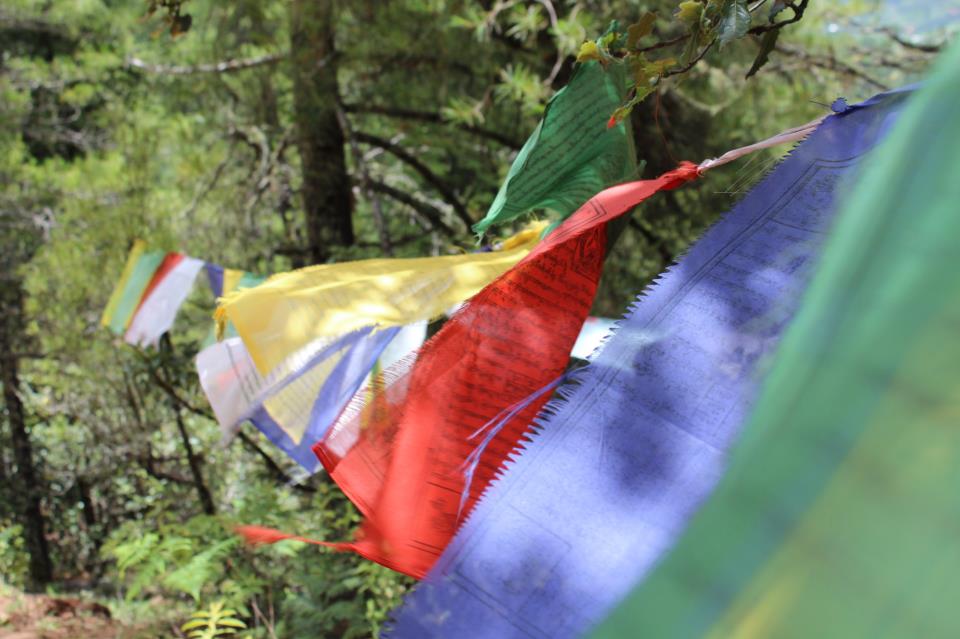
Prayer flags near Takhtshang Monastery
Standing under a tree, waiting for a raincloud to pass, I asked my young guide about Bhutan‘s most famous trademark; Gross National Happiness (“GNH”). GNH was coined in 1972 by Bhutan‘s third king when a foreign journalist mentioned that Bhutan‘s Gross Domestic Product (GDP) was lagging. The king said that regardless of economic measurements, his people were happy, and that’s what counts. “Gross National Happiness is more important than Gross National Product” he said. Bhutan has since developed this into an official policy, and the Bhutanese government produces an annual happiness report to measure the nation’s success. Happiness is measured by four pillars; sustainable development, preservation and promotion of cultural values, conservation of the natural environment, and good governance.
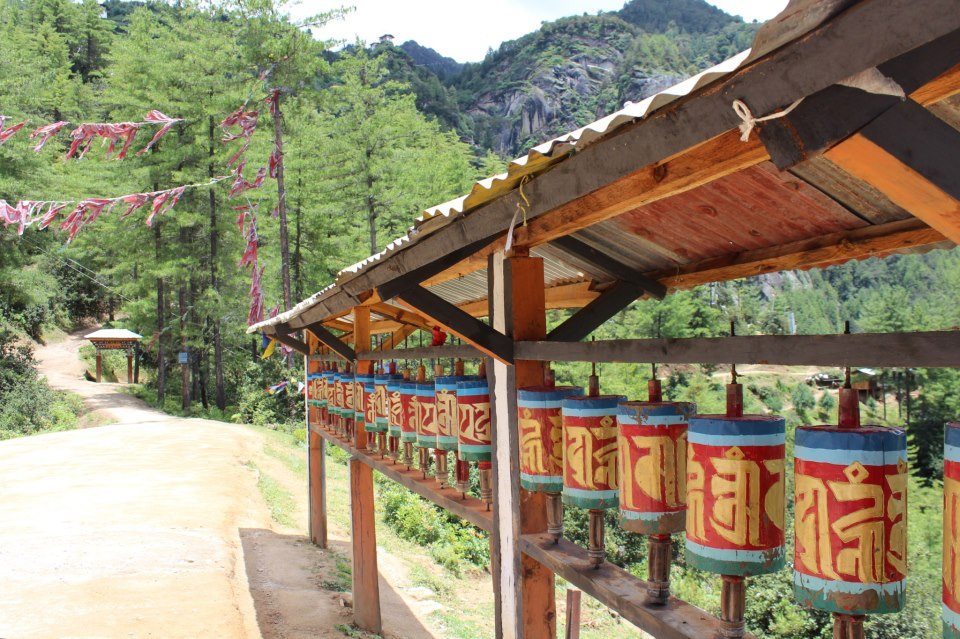
Prayer wheels on the hike to Takhtshang Monastery
While we were waiting for the rain to stop, my guide told me about how Bhutan was aiming for happiness, rather than riches. “Sustainable development – you pay the Bhutanese government $250 a night to come here; instead of going to a businessman’s wallet, that gets invested in education, health and transport for Bhutan‘s future.” He went on to explain that some people profit – like the manager of the hotel where I would stay – but to open a business in Bhutan you have to prove your commitment to sustainable development – you can’t just be in it for the money. As for cultural values – we wear traditional formal clothes, rather than western formal clothes, to work.
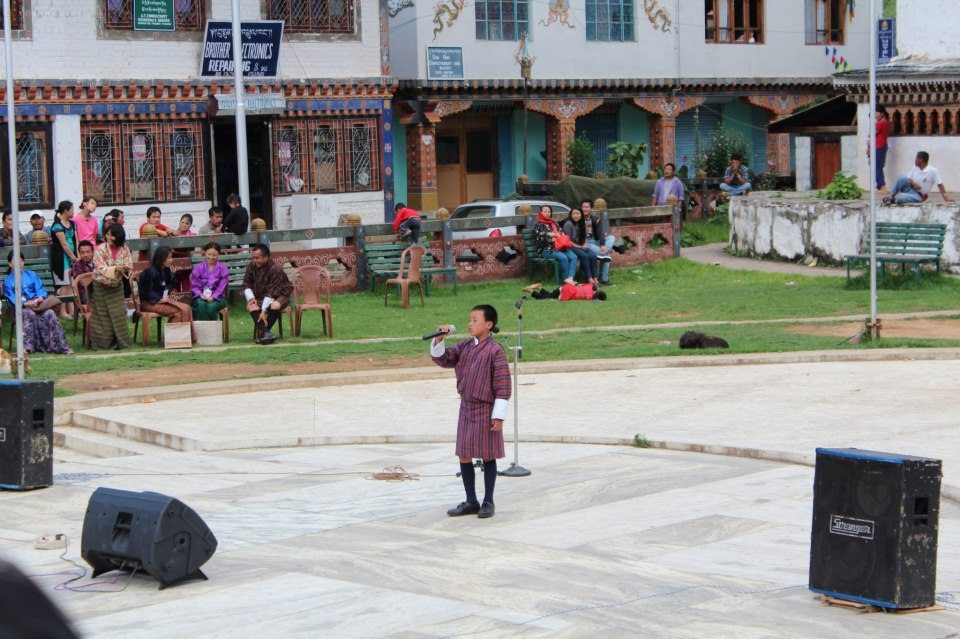
The gho is the traditional dress of Bhutan, worn here by a young star at a community charity concert.
Environmental sustainability – in Bhutan there are no plastic bags, and animals have rights.” In fact about ten years ago, the government began a project to bury high voltage power lines, as they were infringing birds’ rights to a clear sky, as well as being unsightly. And finally good governance; “we love our king, and in 2008 he transitioned Bhutan to a democracy” said my guide.
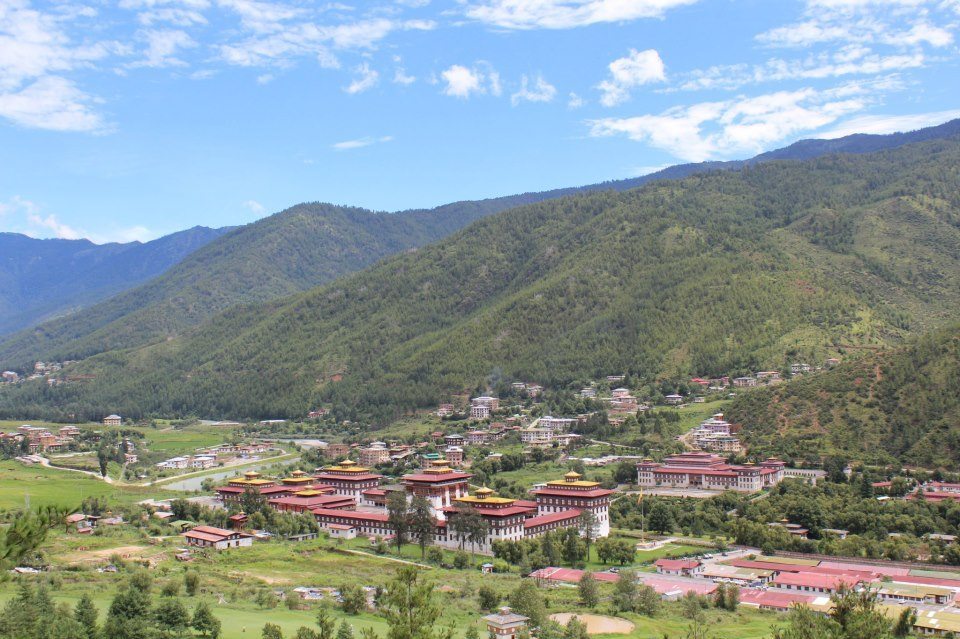
Trashi Chhoe Dzong (Thimphu Monastery) in the foreground, and just behind it to the right, Bhutan’s parliament house, in Thimphu, Bhutan’s capital
The rain abated, and we continued down the mountain to the car park. He also mentioned some of Bhutan‘s other achievements. In 1999 television came to Bhutan – the one Bhutanese television channel broadcasts cultural programming and news for 5 hours each evening. In 2005 Bhutan became the first nation to outlaw smoking, classing tobacco as an illegal drug.
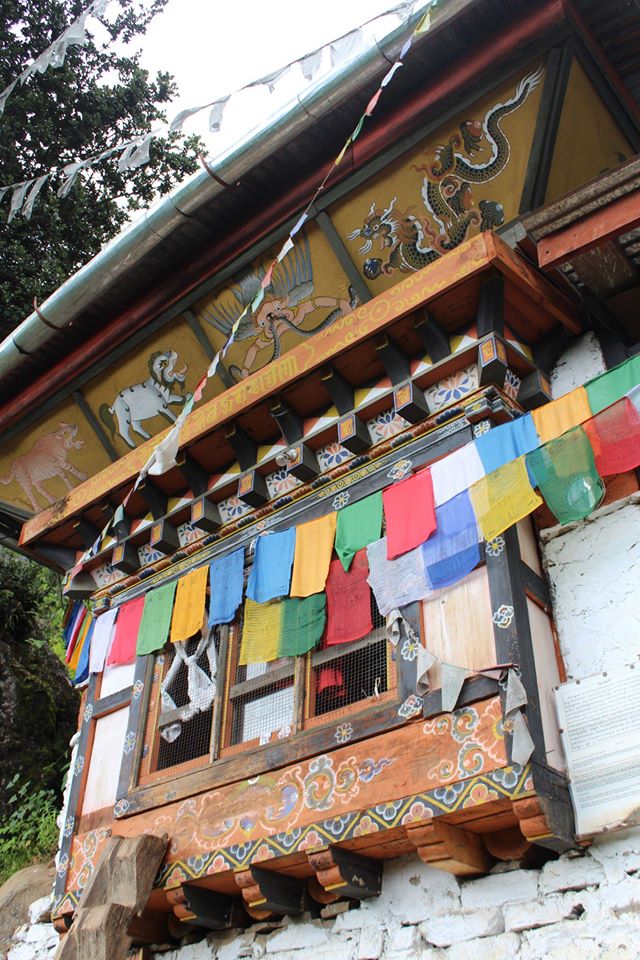
Birthplace of a Je Khenpo (a Buddhist monastic leader) on the trail to Taktshang Goemba (Tiger’s Nest Monastery)
When to go
Peak tourism period in Bhutan is from March to June, as the temperature climbs, and from September to November, after the monsoon recedes. July and August can be rainy, although not unpleasant, and December, January and February see the country covered in a blanket of snow – gorgeous, but very cold and some roads close.
Essential Stats
Culture shock: 8/10
Language difficulty: 4/10
Quality of food: 8/10
Cost: 9/10
Physical demand: 9/10
Advice and warnings
Bhutan is an incredibly safe place in which to travel – the dangers posed by altitude sickness, hiking fatigue and avalanche far outweigh any potential crime or political unrest. That said, do keep an eye on your belongings just in case – this might look like utopia, but you’re still on planet Earth.
Check Smart Traveller or the British Foreign Office for more comprehensive warnings.
Visas
Australians and Pakistanis need a visa in Bhutan, but it is pre-arranged by the travel agency and then collected at Paro airport on arrival. I used the excellent and very friendly Phuentshok Tours and Treks, and would happily recommend them – they organised everything! The price and processing of the visa is worked out on the basis of length of stay.
Indians may visit Bhutan and obtain a visa on arrival, provided that their passport has a further six months of validity.
Getting there and around
No foreign airline regularly flies to Bhutan – only Drukair, which flies to a bunch of regional ports.
Melbourne and Sydney
For Australians the easiest option is via Bangkok. Drukair’s Bangkok – Paro flight costs US$799 return, inclusive of taxes. This will be organised along with the tour package. Drukair doesn’t have interline agreements with any other airlines, so you’ll need to disembark from your flight to Bangkok, collect your baggage and re-check in for Drukair onwards to Bhutan. Be sure to leave enough time – a day or two preferably.
THAI flies to Bangkok at least once daily from each of Melbourne and Sydney. All THAI flights arrive and depart from Survanabhumi International Airport (Bangkok’s main airport).
Melbourne (from $1079 return)
Sydney (from $1096 return)
Discount airline Air Asia flies from Melbourne to Bangkok via Kuala Lumpur from $513 return, while Sydney to Bangkok via Kuala Lumpur is from $547 return. Note that Air Asia uses Don Mueang Airport in Bangkok, the older airport which is now popular with discount airlines. Discount airline Jetstar flies directly from Melbourne to Bangkok with fares starting from $563 return. They operate into the main Bangkok airport at Survarnabhumi.
Lahore
Lahoris heading to Bhutan are best to transit through Kathmandu. Flights on Drukair from Kathmandu to Paro cost US$443 return. PIA flies from Lahore to Kathmandu via Karachi several times a week from PKR 59,067 return. Don’t forget to apply for a multiple entry Nepal visa from the Embassy of Nepal in Islamabad (from US$25).
Chennai
Indian citizens can fly directly from Kolkata to Paro from US$430 return. Indigo and Jet Airways fly from Chennai to Kolkata several times daily.
All transport in Bhutan will be organised as part of the tour.
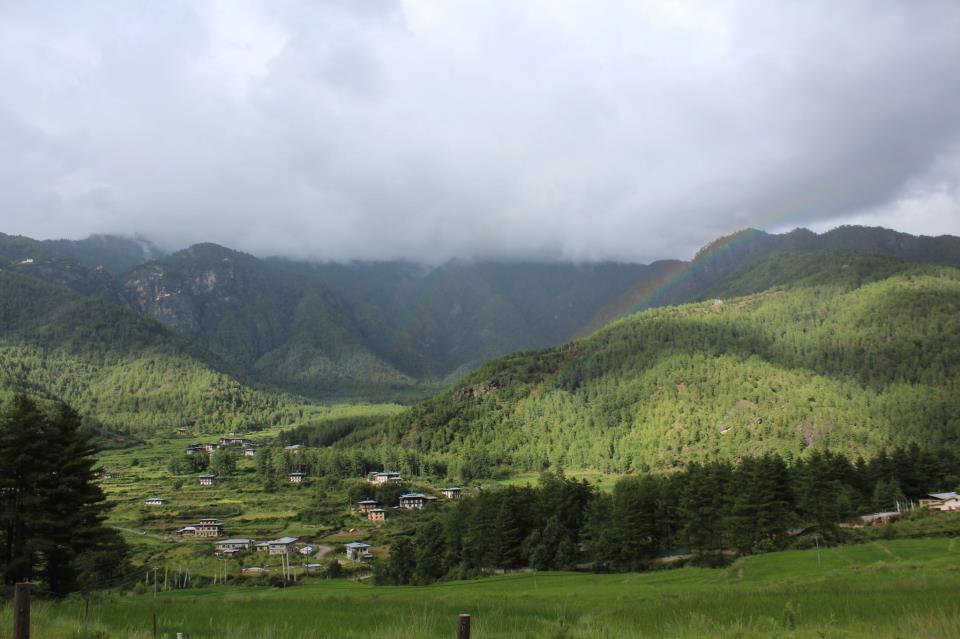
Rainbow over the Paro Valley, Bhutan
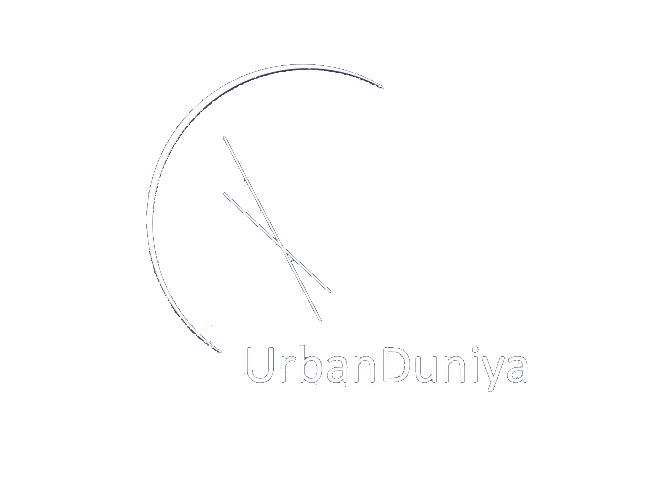
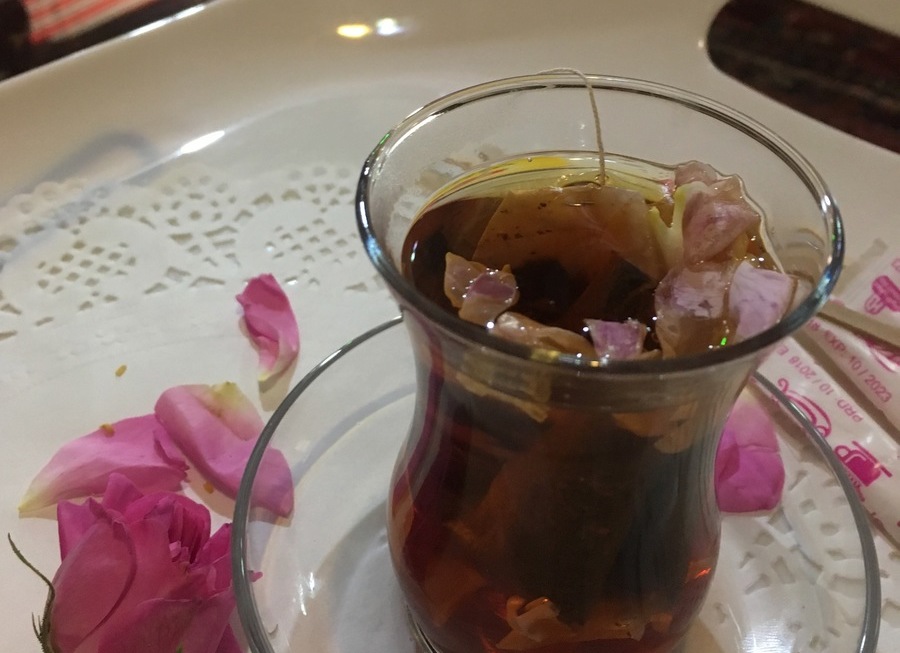


Wow never knew there was a country on Earth the all powerful cigarettes/tobacco lobby couldn’t reach! Makes me want to check it out. Very interesting article, tends to prove that without greed everybody can live a much happier life. In the West we have been conditioned to accept greed as part of our lives we are even convinced it is necessary to our societies! Thank you for showing us a good example of the truth we once knew but choose to forget.
Thanks for reading, Jameela!! Yes, it’s a very different reality which, as you say, we choose to forget. I hope you can go there one day – it’s not cheap, but then a place like that really oughtn’t be, I guess!
My wife has a friend who’s been living in Bhutan now for I guess the best part of the year. I think it’s a pretty basic place from another world. Sounds like the perfect place to travel to!
Interesting! You’ll need to go there some time – it’s a really different place!